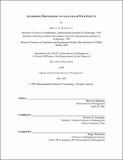Gendering professions : an analysis of peer effects
Author(s)
Rubineau, Brian A. (Brian Ari)
DownloadFull printable version (665.7Kb)
Other Contributors
Sloan School of Management.
Advisor
Roberto M. Fernandez.
Terms of use
Metadata
Show full item recordAbstract
Professional identity is important both to professionals and to the professions of which they are members. In addition to being crucial for professional success at an individual level, and for the maintenance of professional boundaries and autonomy at the collective level, professional identity is an important contributor to the career decisions of professionals including persistence in the profession and specialization choices. When professional identities within a profession differ systematically by sex, these identity-dependent decisions contribute to the sex-segregation of professions or their specialties. Research often implicates professional identity as contributing to the segregation and related gender inequalities documented in numerous professions. Efforts to address these gender inequalities must be informed by the gender dynamics of professional identity formation processes. Despite copious theory, the literature on professional identity formation suffers from being under-tested. In decades of research, there has been little conclusive evidence as to which socialization mechanisms contribute to professional identity formation or how these mechanisms may be gendered. This dissertation provides conclusive evidence for peer influence and gendered peer influence on professional identity formation in engineering. After surveying the literature on identity formation theories, my first study investigates a host of professional identity indicators to establish which aspects of professional identity are associated with gendered persistence in the engineering profession. I identify a role-specific efficacy-related measure as a potential source of gendered persistence in the profession. (cont.) My second study conducts a causal test of peer influence on the development of the efficacy-related measure identified in the previous study. Using the quasi-experiment of roommate assignment, I address the methodological and analytical hurdles that have stymied previous research in this area. I find evidence that men are influenced by their male peers, and find no such influence among women. This result is replicated in a similarly-structured third study from a different professional setting. I conclude that men's informal professional socialization via peers serves a resource for professional identity formation that is not available to women. These studies provide the first conclusive evidence for the role of peers in professional identity formation, and how this peer influence mechanism is gendered.
Description
Thesis (Ph. D.)--Massachusetts Institute of Technology, Sloan School of Management, 2007. This electronic version was submitted by the student author. The certified thesis is available in the Institute Archives and Special Collections. Includes bibliographical references (p. 182-196).
Date issued
2007Department
Sloan School of ManagementPublisher
Massachusetts Institute of Technology
Keywords
Sloan School of Management.